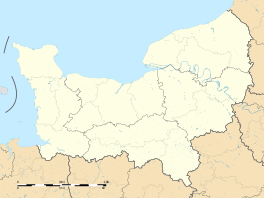Avranches
| Avranches | ||
|---|---|---|

Botanical garden
|
||
|
||
| Coordinates: 48°41′06″N 1°21′20″W / 48.685°N 1.3556°WCoordinates: 48°41′06″N 1°21′20″W / 48.685°N 1.3556°W | ||
| Country | France | |
| Region | Normandy | |
| Department | Manche | |
| Arrondissement | Avranches | |
| Canton | Avranches | |
| Government | ||
| • Mayor (2001–2008) | Guenaël Huet | |
| Area1 | 4.5 km2 (1.7 sq mi) | |
| Population (2009)2 | 8,090 | |
| • Density | 1,800/km2 (4,700/sq mi) | |
| Time zone | CET (UTC+1) | |
| • Summer (DST) | CEST (UTC+2) | |
| INSEE/Postal code | 50025 /50300 | |
| Elevation | 7–108 m (23–354 ft) (avg. 108 m or 354 ft) |
|
|
1 French Land Register data, which excludes lakes, ponds, glaciers > 1 km² (0.386 sq mi or 247 acres) and river estuaries. 2Population without double counting: residents of multiple communes (e.g., students and military personnel) only counted once. |
||
1 French Land Register data, which excludes lakes, ponds, glaciers > 1 km² (0.386 sq mi or 247 acres) and river estuaries.
Avranches (French pronunciation: [avʁɑ̃ʃ]) is a commune in the Manche department in the Normandy region in northwestern France. It is a subprefecture of the department. The inhabitants are called Avranchinais.
By the end of the Roman period, the settlement of Ingena, capital of the Abrincatui tribe, had taken the name of the tribe itself. This was the origin of the name Avranches. In 511 the town became the seat of a bishopric (suppressed in 1790) and subsequently of a major Romanesque cathedral dedicated to Saint Andrew which was dismantled during the French revolutionary period. As the region of Brittany emerged from the Roman region of Armorica, Avranchin was briefly held by Alan I, King of Brittany as part of the Kingdom of Brittany at the turn of the 10th century. The regions that later became the Duchies of Normandy and Brittany each experienced devastating Viking raids, with Brittany occupied by Vikings from 907 to 937. In 933 Avranches and its territory, the Avranchin, were ceded to the Normans.
Hugh d'Avranches, 1st Earl of Chester, a magnate under William the Conqueror, was the son of Richard le Goz, Vicomte d'Avranches.
In 1172 (September 27–28) a council was held at Avranches in response to the murder of Anglo-Norman Saint Thomas Becket. Henry II, King of England, after due penance done at Avranches on 21 May 1172, was absolved from the censures incurred by the assassination of the holy prelate and reached the Compromise of Avranches with the Church, swearing fidelity to Pope Alexander III in the person of the papal legate.
...
Wikipedia



